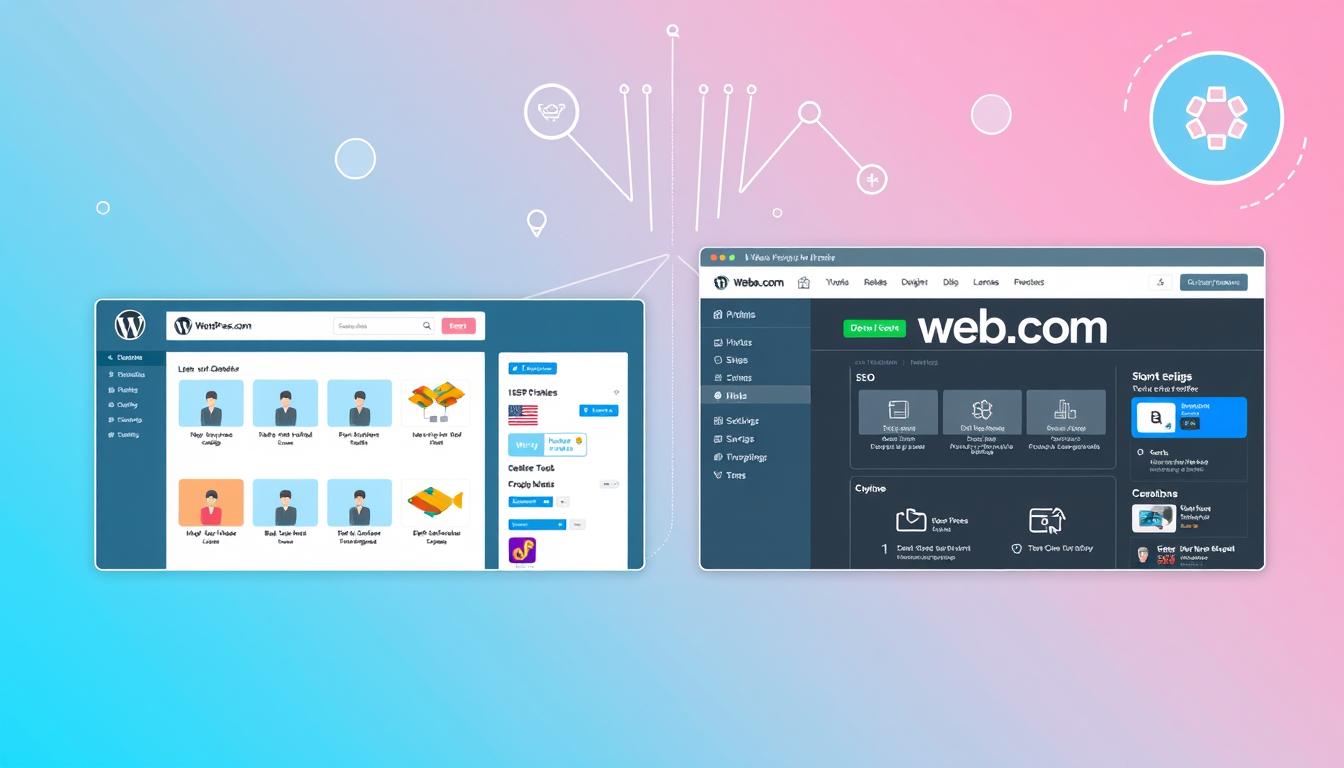I’m exploring two top website builders: WordPress.com and Web.com. They have different features and pricing, so it’s key to know their pros and cons. Today, having a website is a must for businesses and individuals. Picking the right builder is vital for a strong online presence.
I’ll compare WordPress.com and Web.com to guide you. With more people online, having a site is essential. Choosing between WordPress.com and Web.com can greatly impact your online presence.
Key Takeaways
- WordPress.com and Web.com are two popular website builders with different features and pricing plans, making wordpress.com vs web.com a crucial comparison for online presence.
- Understanding the strengths and weaknesses of each platform is essential for making an informed decision about your website builder.
- WordPress.com offers a wide range of templates and plugins, while Web.com is known for its easy-to-use website-building tools at an affordable price, making it a great option for small businesses and online presence.
- Both platforms have their own unique features, such as ecommerce capabilities and customer support, that can impact your online presence with a website builder.
- Comparing WordPress.com and Web.com can help you choose the right website builder for your project and establish a strong online presence.
- WordPress.com vs Web.com is a comparison that can help you decide which website builder is best for your online presence needs.
- Establishing a strong online presence requires a reliable website builder, and wordpress.com vs web.com is a comparison that can help you make the right choice.
Understanding WordPress.com and Web.com at a Glance
Choosing a website builder means looking at what each platform offers. WordPress.com and Web.com are two big names in this field. WordPress.com is great for those who want to customize their site a lot. It has many templates and plugins to choose from.
Web.com, on the other hand, is all about ease. It handles domain registration, hosting, and building your site with a drag-and-drop tool. This makes it perfect for people who don’t want to deal with the technical stuff.
When deciding between WordPress.com and Web.com, consider these points:
- Customization options: WordPress.com has a lot of templates and plugins. Web.com has fewer design choices.
- Domain registration: Both offer this service. But WordPress.com gives you more flexibility and better integration with its builder.
- Hosting services: Web.com has shared, VPS, and dedicated hosting. WordPress.com focuses on managed hosting with updates, backups, and security.

So, which one is right for you? If you want a flexible and customizable site, WordPress.com might be best. But if you want something easy to use with lots of hosting options, Web.com could be your choice.
| Platform | Customization Options | Domain Registration | Hosting Services |
|---|---|---|---|
| WordPress.com | Highly customizable | Flexible options | Managed hosting |
| Web.com | Limited customization | Standard options | Shared, VPS, dedicated hosting |
User Interface and Ease of Use
Creating a small business website means looking at the user interface and ease of use. A good interface can greatly impact your online success. Web.com offers a drag-and-drop builder, perfect for those without coding skills. WordPress.com, on the other hand, has a more complex interface but offers more customization.
Web.com is easier for beginners, with a simpler setup process. WordPress.com is more challenging but offers more flexibility. It’s important to compare platforms and think about your needs and skills.
When checking out a website platform, consider these features:
- Drag-and-drop functionality
- Customization options
- Learning curve
- Technical support

By looking at these factors, you can pick the best platform for your small business website.
| Platform | User Interface | Ease of Use |
|---|---|---|
| Web.com | Drag-and-drop | Easy |
| WordPress.com | Complex | Challenging |
Pricing Plans and Value Analysis
Pricing plans are key when choosing web development and hosting services. We’ll look at WordPress.com and Web.com’s plans and features. This will help you decide which is best for you.
WordPress.com has several plans. The Personal plan starts at $4 a month and includes a free domain for a year. The Premium plan is $8 a month, and the Business plan is $25 a month. The Commerce plan, for e-commerce sites, is $45 a month.
Web.com’s plans are a bit different. The Site plan starts at $14 a month, and the ecommerce plan starts at $29 a month. Web.com’s plans might cost more, but they offer advanced features and creative control.
Here’s a table that compares WordPress.com and Web.com’s pricing plans:
| Platform | Plan | Price |
|---|---|---|
| WordPress.com | Personal | $4/month |
| WordPress.com | Premium | $8/month |
| WordPress.com | Business | $25/month |
| WordPress.com | Commerce | $45/month |
| Web.com | Site | $14/month |
| Web.com | Ecommerce | $29/month |
Choosing between WordPress.com and Web.com depends on your needs. Look at their plans and features to find the best fit for your budget and needs.
Design Templates and Customization Options
Designing a website is easier with the right tools. WordPress.com alternatives like WordPress.com offer many customizable templates. This lets users create a site that’s truly their own. Web.com, on the other hand, has fewer templates but they’re more focused on business needs.
Customization is key when choosing a platform. WordPress.com gives users a wide range of templates to pick from. They can then customize these templates to fit their style. Web.com’s templates, while fewer, are designed for ease of use and quick setup.
- Customizable templates
- Drag-and-drop editor
- Responsive design
- E-commerce integration
Looking at these points helps users decide between WordPress.com and Web.com. By exploring wordpress.com alternatives and web.com features, they can find the best website builder for them.
Choosing between WordPress.com and Web.com depends on what you need. Think about design templates and customization options. This way, you can build a website that helps you achieve your online goals.
Domain Registration and Hosting Services Compared
Building a website needs domain registration and hosting services. WordPress.com and Web.com provide these services. They include domain management, hosting performance, and security. Knowing these details helps you choose wisely.
Both WordPress and web hosting plans offer 100 GB SSD storage and unlimited bandwidth for $2.99/month. The main difference is in the extra features. Web hosting comes with Hostinger Website Builder and Git access. WordPress hosting has pre-installed WordPress and optimization plugins.
Managed WordPress hosting is great for about 43% of WordPress users. It makes setup easy, performance optimal, and management hassle-free. Domain names cost from $10 to hundreds, based on their uniqueness. Web hosting costs around $100 yearly.
| Hosting Type | Features | Cost |
|---|---|---|
| Shared Hosting | 100 GB SSD storage, unlimited bandwidth | $2.99/month |
| WordPress Hosting | Pre-installed WordPress, optimization plugins | $2.99/month |
| Managed WordPress Hosting | Easier setup, optimal performance, hassle-free management | Varies |
In conclusion, picking the right domain registration and hosting services depends on your needs. Consider your site’s size, traffic, and budget. Each option has its own features and benefits, so choose wisely.
E-commerce Capabilities and Business Features
Building a small business website means looking at e-commerce and business features. It’s key to compare website platforms based on their e-commerce functions. WordPress.com has many e-commerce plugins, like WooCommerce, for a full e-commerce solution. Web.com, while limited, still works for small businesses.
WordPress.com’s e-commerce features stand out:
- Over 1,200 e-commerce-focused templates for building sites
- WooCommerce, a popular e-commerce plugin, allows users to choose from multiple payment gateways
- E-commerce plugins like TrustPulse and Cart Recovery can help enhance user experience and boost conversions
Customization and user experience are also crucial. WordPress.com has a huge library of plugins and themes. This lets users turn a simple site into a full e-commerce platform. With millions of users and developers, WordPress offers a lot of resources and support.
In conclusion, when picking a website platform for a small business, look at e-commerce and business features. By examining each platform’s features and customization options, businesses can make the right choice for their needs.
| Platform | E-commerce Capabilities | Customization Options |
|---|---|---|
| WordPress.com | WooCommerce, e-commerce plugins | Vast library of plugins and themes |
| Web.com | Limited e-commerce functionality | Customization options available |
SEO Tools and Marketing Features
SEO is key for web development and a strong online presence. WordPress.com and Web.com both offer SEO tools and marketing features. These help users boost their website’s visibility and reach more people.
WordPress.com has a variety of SEO plugins like Yoast SEO. These tools help optimize content and structure. Web.com, while limited, is good for small businesses and individuals wanting a basic online presence.
Marketing Integration Options
Marketing integration is vital for any website. WordPress.com has many options, including social media buttons and email marketing tools. Web.com also offers some, but fewer than WordPress.com.
Analytics and Reporting
Analytics and reporting are crucial for any website. WordPress.com provides tools like Google Analytics for tracking traffic and engagement. Web.com has basic analytics and reporting tools.
Some important stats to consider when choosing a website builder include:
- SEO can generate a 12.2 times higher ROI than other marketing platforms
- WordPress holds a market share of over 43.5% of all websites
- Webflow hosts over 3.5 million designers and teams in 190 countries
The choice between WordPress.com and Web.com depends on your needs. WordPress.com offers more SEO tools and marketing features. Web.com is better for those seeking a simple, user-friendly builder.
| Website Builder | SEO Tools | Marketing Features |
|---|---|---|
| WordPress.com | Yoast SEO, All in One SEO Pack | Social media sharing buttons, email marketing tools |
| Web.com | Basic SEO functionality | Limited marketing integration options |
Customer Support and Resource Availability
Choosing a website builder means looking at customer support and resources. You want reliable help when you need it. WordPress.com and Web.com take different approaches to this.
WordPress.com has a huge community of users and developers. This community offers lots of knowledge and support. It’s great for those who like community help.
Web.com, on the other hand, has a smaller support system. But it’s still good for small businesses. Web.com offers phone, email, and live chat support. This means you can get help in several ways.
When looking at wordpress.com alternatives, think about the support each offers. Web.com features like its drag-and-drop builder are also worth considering. These features make it easy to use.
Support Channels Comparison
- Phone support: Web.com offers phone support, while WordPress.com relies on community support and online resources.
- Email support: Both WordPress.com and Web.com offer email support, providing users with a convenient way to get help.
- Live chat: Web.com offers live chat support, while WordPress.com does not.
Choosing between WordPress.com and Web.com depends on what you need. WordPress.com is great for community support and resources. Web.com is better if you want traditional support like phone and live chat.
Explore wordpress.com alternatives and web.com features to find the best for your website.
WordPress.com vs Web.com: Performance and Reliability
Choosing a website builder means looking at performance and reliability. A good website builder keeps your site up and running for your visitors. WordPress.com and Web.com differ in these areas, like uptime, speed, and security.
WordPress.com leads with a 99.99% uptime, making your site almost always on. Web.com offers various plans with different uptime and speed levels. It’s key to pick a builder based on hosting services and how they affect your site’s performance.
Look for these hosting features:
- Uptime guarantee
- Speed and loading times
- Security features, such as SSL certificates and firewalls
- Customer support and resource availability
WordPress.com handles hosting, software, and server upkeep, making it easy for users. Web.com provides shared, VPS, and dedicated hosting, offering more control.
Choosing between WordPress.com and Web.com depends on your needs. WordPress.com is great for top-notch performance and reliability. Web.com is better for those wanting more hosting options and control.
| Website Builder | Uptime Guarantee | Speed and Loading Times | Security Features |
|---|---|---|---|
| WordPress.com | 99.99% | Fast loading times | SSL certificates, firewalls |
| Web.com | Varying levels of uptime | Varying loading times | SSL certificates, firewalls |
Conclusion: Making Your Final Choice
The choice between WordPress.com and Web.com depends on what you need. WordPress.com is great for those who want more control and customization. On the other hand, Web.com is easier to use and has features for businesses.
WordPress.com is perfect if you want to design your site yourself. It has a huge library of plugins and full control over your site. But, if you prefer an easy setup and don’t want to manage hosting, Web.com might be better. It’s ideal for small businesses and individuals.
Both WordPress.com and Web.com can help you create a strong online presence. By considering the points in this article, you can choose the best option for your website. This will ensure your site’s success in the long run.
FAQ
What are the key differences between WordPress.com and Web.com?
Which platform is easier to use for those without coding knowledge?
How do the pricing plans of WordPress.com and Web.com compare?
What are the differences in design templates and customization options?
How do the domain registration and hosting services compare between the two platforms?
What are the e-commerce and business features of each platform?
How do the SEO tools and marketing features compare between WordPress.com and Web.com?
Which platform offers better customer support and resource availability?
How do the performance and reliability of WordPress.com and Web.com differ?
Source Links
- Website Builder vs WordPress: Choosing the Right Platform for You – https://www.hostinger.com/tutorials/website-builder-vs-wordpress
- Web.com vs WordPress | Compare Features, Pricing, and More – https://www.zegashop.com/web/builder_comparisons/web-com-vs-wordpress-whats-the-best-builder-in-2024/
- 13 Best Website Builders of 2024 Compared & Tested – https://www.wpbeginner.com/beginners-guide/how-to-choose-the-best-website-builder/
- WordPress.com vs WordPress.org: What’s the Difference? – https://wordpress.com/go/website-building/wordpress-com-vs-wordpress-org/
- What is the difference between WordPress .Com and .Org? | Learn WordPress – https://learn.wordpress.org/lesson/what-is-the-difference-between-wordpress-org-and-com/
- WordPress.com vs WordPress.org: What’s the difference? | WordPress.com – https://wordpress.com/support/com-vs-org/
- Webflow vs WordPress: Which is Better in 2024? » Soflyy – https://soflyy.com/webflow-vs-wordpress/
- Webflow vs. WordPress: Which is better for your website? [2024] | Zapier – https://zapier.com/blog/webflow-vs-wordpress/
- Webflow vs WordPress: Which is More User-Friendly? – https://positiwise.com/blog/webflow-vs-wordpress
- WordPress vs Webflow – Features, Price and UX Compared – https://tech.co/website-builders/wordpress-vs-webflow
- The 15 Cheapest Website Builders in 2024 – https://www.tooltester.com/en/blog/cheapest-website-builder/
- WordPress vs. Webflow: The Ultimate Showdown – Farinella – https://farinella.com/wordpress-vs-webflow-the-ultimate-showdown/
- Webflow vs WordPress: essential guide to choosing most fitting CMS for your website — Halo Lab – https://www.halo-lab.com/blog/wordpress-vs-webflow
- Custom Website Design Versus WordPress Template Websites – https://www.iqcomputing.com/support/articles/custom-website-design-vs-templates/
- WordPress Hosting vs Web Hosting: Advantages and Disadvantages to Help You Choose – https://www.hostinger.com/tutorials/wordpress-hosting-vs-web-hosting
- WordPress Hosting vs Web Hosting: Which Is Best? – Name.com Blog – https://www.name.com/blog/wordpress-hosting-vs-web-hosting-which-is-best
- How to Choose a Domain Name and Web Hosting for Your WordPress Site – https://www.nobledesktop.com/learn/wordpress/how-to-choose-a-domain-name-and-web-hosting-for-your-wordpress-site
- Is WordPress Good for Ecommerce? [Pros and Cons] – https://www.webfx.com/blog/web-design/is-wordpress-good-for-ecommerce/
- Can You Use WordPress for E-commerce? – https://www.flyingvgroup.com/wordpress-for-ecommerce/
- Why WordPress is the Perfect Choice for Your Business Website – https://www.sumydesigns.com/why-wordpress-is-the-perfect-choice/
- Webflow vs. WordPress for SEO – Which One is Best? – https://www.archcowebdesign.com/blog/webflow-vs-wordpress-for-seo
- Webflow vs WordPress for SEO [ Pros & Cons ] – AUQ.io – https://auq.io/blog/webflow-vs-wordpress-for-seo/
- WordPress vs Web.com – https://www.elegantthemes.com/blog/wordpress/wordpress-vs-web-com
- WordPress Hosting vs. Web Hosting: Which One to Choose? – https://www.cnet.com/tech/services-and-software/wordpress-hosting-vs-web-hosting/
- WordPress.com vs. Pressable: Which Hosting Solution Is Right for Your WordPress Site? – Inspry – https://www.inspry.com/wordpress-com-vs-pressable-which-hosting-solution-is-right-for-your-wordpress-site/
- WordPress.org or WordPress.com- Which one is better? – https://wpexcel.cedcommerce.com/wordpress-org-or-wordpress-com/
- All Day Web Design & Hosting – https://www.alldayweb.com/blog/wordpress-vs-custom-web-design.php
- WordPress.com vs WordPress.org | White Peak Digital – https://www.whitepeakdigital.com/blog/wordpress-com-vs-wordpress-org/
- Web.com Review – Pros, Cons & Hosting Alternatives – https://larryludwig.com/web-com-review/




